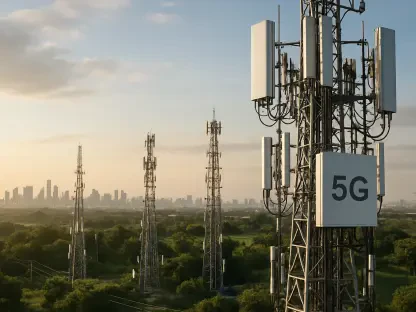Juniper Networks recently issued pivotal security updates to address several high-severity vulnerabilities within its Junos OS platform, underscoring the critical importance of staying updated to prevent potential cyber threats. Among the newly addressed issues is a critical flaw, identified as CVE-2025-21598, residing in the Routing Protocol Daemon (RPD). This vulnerability could result in Denial of Service (DoS) attacks if malicious actors exploit malformed BGP packets, with the risk heightened for systems with packet receive trace options enabled. To mitigate this threat, users are strongly advised to disable these tracing options and vigilantly monitor for any signs of malformed updates.
Another significant and high-risk vulnerability, CVE-2025-21599, affects the Juniper Tunnel Driver (JTD). This issue could lead to unauthorized network-based DoS attacks via specific malformed IPv6 packets, which ultimately causes kernel memory exhaustion and subsequent system crashes. This type of attack could potentially destabilize entire network operations, hence the swift application of the patch is urged. Furthermore, Juniper Networks addressed vulnerabilities in OpenSSH components, notably CVE-2024-6387 (regreSSHion) and CVE-2024-39894, within Junos OS. These vulnerabilities had the potential to compromise system security, but timely patches have significantly mitigated these threats.
Additional Updates and Vulnerabilities
Besides these critical updates, Juniper Networks has taken extensive measures to enhance security across different components of its platform. The latest updates for Junos Space version 24.1R2 resolved almost 60 vulnerabilities found in third-party components. Among these, some of the most severe issues were detected in the Expat XML parser library. Addressing these vulnerabilities is crucial as they could have profound impacts on system performance and security. Medium-severity bugs in Junos OS and Junos OS Evolved were also patched, which could otherwise lead to DoS conditions or unauthorized information disclosures.
Although none of these vulnerabilities have been exploited in the wild, the proactive stance taken by Juniper Networks serves as a reminder of the continuous nature of cybersecurity threats. Historically, Junos OS vulnerabilities have been attractive targets for cyber attackers. Thus, the importance of promptly applying all relevant security patches cannot be overstated. Users and administrators must frequently check for updates and apply them immediately to protect systems from potential exploits.
Ensuring Robust Security
Juniper Networks recently released crucial security updates to address multiple high-severity vulnerabilities in its Junos OS platform, emphasizing the need to stay updated to prevent cyber threats. Among the resolved issues is a critical flaw, CVE-2025-21598, in the Routing Protocol Daemon (RPD). This vulnerability could allow Denial of Service (DoS) attacks if attackers exploit malformed BGP packets, especially on systems with packet receive trace options enabled. Users should disable these tracing options and monitor for malformed updates to mitigate this threat.
Another significant vulnerability, CVE-2025-21599, affects the Juniper Tunnel Driver (JTD), potentially leading to unauthorized network-based DoS attacks via specific malformed IPv6 packets. This can cause kernel memory exhaustion and system crashes, potentially destabilizing entire network operations, making it crucial to apply patches promptly. Additionally, Juniper Networks addressed vulnerabilities in OpenSSH components within Junos OS, notably CVE-2024-6387 (regreSSHion) and CVE-2024-39894, which could have compromised system security. Timely patches have significantly reduced these threats.









